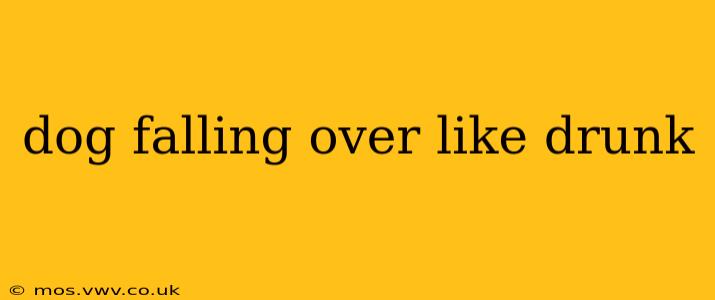Has your furry friend started stumbling, swaying, and unexpectedly collapsing? Seeing your dog falling over like they're drunk is alarming, and understandably so. While a playful tumble is normal, frequent, unexplained falls warrant immediate veterinary attention. This isn't just about a clumsy dog; it could be a sign of a serious underlying health issue. This comprehensive guide explores potential causes, diagnostic steps, and treatment options to help you understand and address this concerning behavior.
What Could Cause My Dog to Fall Over?
Many factors can contribute to a dog exhibiting drunken-like behavior, ranging from minor issues to severe medical conditions. Let's explore some common culprits:
1. Vestibular Disease: This is a frequent suspect when a dog suddenly displays imbalance, tilting their head, and falling. Vestibular disease affects the inner ear, responsible for balance and spatial orientation. It can be idiopathic (with no known cause) or caused by infections, tumors, or trauma. Symptoms often include nystagmus (rapid, involuntary eye movements), nausea, and vomiting.
2. Neurological Issues: Problems within the brain or spinal cord can significantly impact coordination and motor skills. Conditions such as brain tumors, strokes, and encephalitis can lead to ataxia (loss of coordination), weakness, and falls. These conditions require urgent veterinary intervention.
3. Hypoglycemia (Low Blood Sugar): Especially prevalent in small breeds and diabetic dogs, low blood sugar can cause weakness, tremors, seizures, and collapse. It requires immediate treatment with glucose supplementation.
4. Intoxication: Accidental ingestion of toxins, medications, or alcohol can cause neurological symptoms mimicking intoxication. Prompt identification and treatment of the toxin are vital.
5. Metabolic Disorders: Problems with the liver, kidneys, or other organs can disrupt neurological function, leading to ataxia and falls. This often manifests as a gradual decline in coordination rather than a sudden onset.
6. Inner Ear Infection: An infection within the inner ear can directly affect balance and coordination, leading to similar symptoms as vestibular disease.
7. Degenerative Myelopathy: This progressive spinal cord disease affects older dogs, causing weakness, ataxia, and eventual paralysis.
8. Trauma: A head injury or spinal cord injury can severely impact coordination and cause falls. Immediate veterinary care is crucial in such cases.
My Dog is Falling Over and Seems Disoriented: What Should I Do?
If your dog exhibits sudden or frequent falls, disorientation, or other neurological signs, seek immediate veterinary attention. Don't delay; rapid diagnosis and treatment can significantly improve the outcome. Your veterinarian will conduct a thorough physical examination, possibly including blood tests, X-rays, and neurological assessments to determine the underlying cause.
How is this Diagnosed?
Diagnosis involves a combination of methods:
- Physical Examination: Your vet will carefully assess your dog's overall health, neurological function, and gait.
- Blood Tests: These help rule out metabolic disorders, infections, and other systemic issues.
- Imaging: X-rays, CT scans, or MRIs may be used to visualize the brain, spinal cord, and inner ear for abnormalities.
- Neurological Examination: This tests reflexes, coordination, and other neurological functions.
What Treatments are Available?
Treatment will depend on the underlying cause. Options range from supportive care for vestibular disease (allowing the condition to resolve naturally) to medications for infections or neurological disorders, and even surgery for tumors or trauma.
Can My Dog Recover?
The prognosis varies greatly depending on the cause and severity of the condition. Some conditions, like idiopathic vestibular disease, often resolve spontaneously. Others, like progressive neurological diseases, may have a less optimistic outlook. Close collaboration with your veterinarian and following their recommendations are key to maximizing your dog's chances of recovery.
Is it Always Serious?
While some causes are less serious and might resolve on their own, others require urgent medical intervention. It’s crucial to err on the side of caution and seek professional veterinary care to ensure your dog receives the appropriate diagnosis and treatment. Delaying veterinary care can lead to irreversible damage in some cases.
How Can I Prevent This From Happening Again?
Prevention depends heavily on the underlying cause. For conditions like hypoglycemia, careful dietary management is crucial. Regular veterinary checkups are also essential for early detection of any underlying health problems.
Remember, your dog’s health is paramount. If you notice your dog falling over like they're drunk, don't hesitate to contact your veterinarian immediately. Early intervention can make a significant difference in their recovery and overall well-being.
